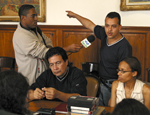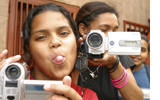| Throughout
Christmas 2002 Venezuela was overshadowed by a
nationwide oil strike polarizing the views of
an already politically divided country. This national
strike started a chain reaction of events that
eventually led to one small community taking control
of their local school.
While these strikes were taking place, the Director
of the Juan Bautista Alberdi school, together
with a group of teachers, closed down the institution
in support of the opposition’s attempt to
undermine the national government - expressing
that they would only return when Chavez had been
successfully ousted from the presidency.
 In
response to these actions the parents, students
and other representatives of the district of Manicomio,
the area on the western outskirts of Caracas where
the school is located, formed ‘The Children's
Defence Committee’, in order to support
the local youth’s rights to education. On
January 9, 2003, the community broke into and
occupied the school with the intention of reopening
it as soon as possible. In
response to these actions the parents, students
and other representatives of the district of Manicomio,
the area on the western outskirts of Caracas where
the school is located, formed ‘The Children's
Defence Committee’, in order to support
the local youth’s rights to education. On
January 9, 2003, the community broke into and
occupied the school with the intention of reopening
it as soon as possible.
However, the conditions they found were shocking:
the building itself was a run-down wreck –
not structurally sound, with no proper toilets
or running water - and the classrooms lacked basic
teaching materials including desks, blackboards
and books.
The local community set about renovating the building,
overcoming the limited means and resources they
had with all their enthusiasm, energy and hard
work. The people of Manicomio started getting
hold of new teaching equipment using their collected
money to set up proper classes for their children.
This meant a direct commitment from the neighbourhood
members, with many of them working full time on
a voluntary basis to get things up and running.
Once re-opened, the community itself became the
teachers, organizers and maintainers of the Alberdi
school, working on average 6 days a week, starting
at 7am every morning up until late at night –
always exclusively on a voluntary basis.
The main objective, according to Gabriela Leon
(representative of the committee), was “to
make the children's rights valued. This place
is now open to everybody, and for the first time
the parents actively contribute to their children's
education.” But that’s not all: the
school also hosts free adult classes open to members
of the community willing to improve their education.
The community was granted the right to teach the
government directed educational schemes - Robinson,
Rivas, and Sucre. Mission
Robinson is Venezuela’s nationwide
literacy campaign; Mission Ribas represents
secondary level education, and Mission Sucre
is preparation for university. They also teach
mission Vuelvan Caras, a basic practical vocational
training that focuses on learning skills such
as plumbing and electrics.
 The
community committee, with the help of one of Venezuela’s
national television channels - Vive! TV -
created within the school a media department that
produces a newspaper for the children and a special
facility entitled ‘the Popular School of
Latin American Cinema’. It consists of a
media lab in which the children are taught how
to produce and direct their own documentaries,
which are then broadcast weekly on Vive! TV. The
community committee, with the help of one of Venezuela’s
national television channels - Vive! TV -
created within the school a media department that
produces a newspaper for the children and a special
facility entitled ‘the Popular School of
Latin American Cinema’. It consists of a
media lab in which the children are taught how
to produce and direct their own documentaries,
which are then broadcast weekly on Vive! TV.
All of this has been achieved in the two years
following the occupation of the school, and is
still going on today.
|